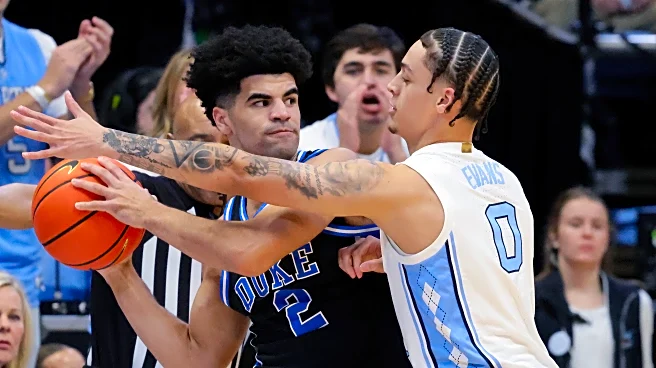What's Happening?
Nottingham Forest has appointed Sean Dyche as their third manager of the season, following the departure from Ange Postecoglou's high-pressing, possession-based football. Dyche, who has signed a contract until 2027, is expected to implement a pragmatic,
resilient style of play, focusing on defensive compactness and set-piece threats. His preferred 4-4-2 formation will prioritize width from disciplined midfielders and a strong strike partnership, aiming to create a compact unit that forces opposition wide. Dyche's immediate challenge is to organize the defense, which struggled under Postecoglou's aggressive approach.
Why It's Important?
The appointment of Sean Dyche marks a significant shift in Nottingham Forest's strategy, as the club seeks stability and Premier League survival. Dyche's experience and tactical approach could provide the necessary defensive organization and resilience to secure their position in the league. This change is crucial for the club's future, as maintaining Premier League status is vital for financial stability and attracting talent. Dyche's focus on set-pieces and defensive solidity may benefit the team, potentially leading to improved performances and results.
What's Next?
Sean Dyche's immediate task will be to instill his tactical philosophy and organize the defense. He will likely rely on key players like Murillo and Milenković to win aerial battles and ensure defensive compactness. The team may undergo adjustments to accommodate Dyche's style, with potential changes in player roles and formations. The upcoming matches will test Dyche's strategies and their effectiveness in securing points for Nottingham Forest. The club's management and fans will closely monitor the team's progress under Dyche's leadership.
Beyond the Headlines
Dyche's appointment may influence Nottingham Forest's long-term strategy, potentially leading to a cultural shift within the club. His emphasis on resilience and pragmatism could redefine the team's identity, impacting player recruitment and development. The managerial change also highlights the challenges faced by clubs in maintaining stability and adapting to the competitive demands of the Premier League. Dyche's success or failure could have broader implications for managerial trends and tactical approaches in English football.















